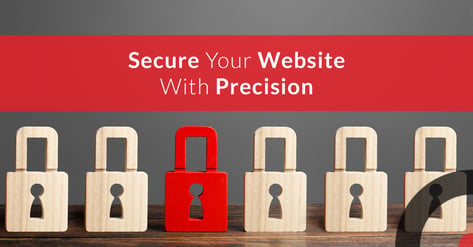Essential Website Security Features
Website security is an essential aspect of your business. Maintaining an effective security plan helps prevents hacks or faults from occurring to your website or system. Many companies set up simulated internal hacks to set up temporary servers for malicious actions or relay spam emails through the web server. By having effective website security, you are able to prevent your website from any potential breaches or compromises. There are a number of features you should consider including to ensure your website will be secure enough to handle possible issues.
Why is Your Website Security Essential?
Your website represents your brand and business. A hack or breach may have a devastating effect on your website's traffic and sales. Also, a violation of your clients' data may result in irreparable consequences to your brand's reputation, and lawsuits will pile up at your doorstep. Many people take website security for granted and think that their website’s integrity cannot be compromised. The truth is that almost half of all website breaches are focused on small companies. Getting the proper security and protection may potentially safeguard your company's success. It’s important to know that securing your website is not a one-time thing. It serves as a regular process carried out as part of your website's management.
Secure Sockets Layer (SSL)
Your first line of defense when it comes to web security is SSL certification. This certificate offers the required privacy and security on the internet. SSL certificate encrypts any data from your webserver to your client's browser. It will ensure that all information and messages will not be interrupted or intercepted during transit. A SSL-certified website will have a green padlock on the left of the URL bar. Depending on the browser, a left-click on the padlock will show the “Connection is Secure” message. In addition, a secure certified website uses a Hyper Transfer Protocol Secure (HTTPS) URL prefix. It should be noted, however, that SSL only encrypts and protects data in transit. It does not prevent website breaches and attacks.
Secure Your Passwords
While it may seem obvious, password protection is very crucial to your website. Many people prefer a more accessible password that they can remember, and more often than not, decide to use the same passwords for their emails, computers, and any other online platforms. When it comes to security, having a strong password is your lifeline. With identity theft becoming a common occurrence, a complicated and secure password is the foundation of not only your website but your online presence. Strong passwords are critical security features for your website. A strong password should include numbers, upper-case and lower-case characters, and special symbols (#, &, %, etc.) A complicated password means fewer chances of hacking and better security for your website.
Update Your Site Regularly
Many website users have frequently relied on outdated plugins and software to save money. Outdated Customer Management Systems (CMS) software is a problem for many companies, as they increase vulnerability to hacks. More often than not, any introduction of a plugin or software update includes new security features and bug fixes, which reduces your chances of a cyber-attack. If you have any outdated plugins or software on your website, make sure that they are updated or deleted if used or if an update has not been rolled out for an extended period.
Secure Your Website With Precision
Implementing advanced website security measures is an absolute necessity these days! Contact us today to start protecting you and your users' valuable data.
